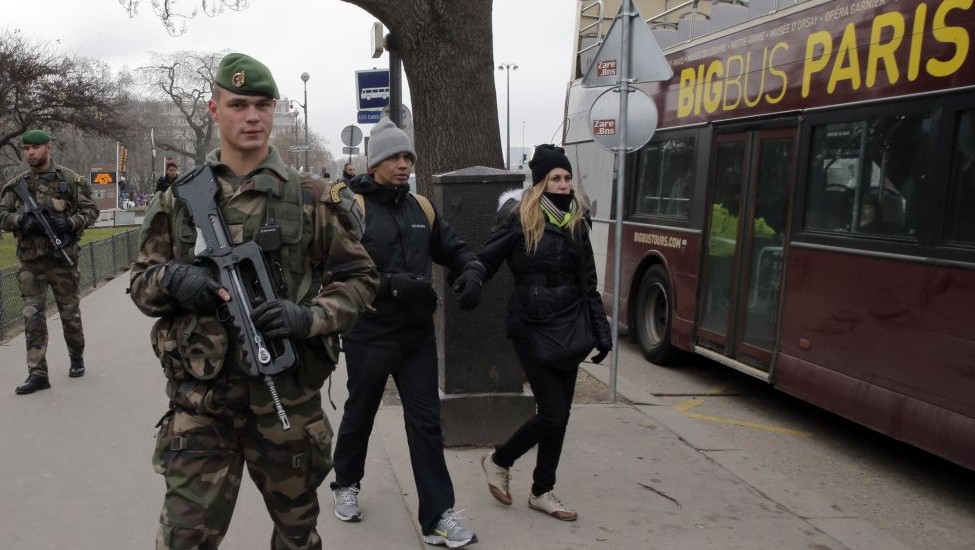“The threat can come from organized groups and networks” as well as from “loners or small groups who sympathize with some jihadist group.”
The attacks likely could be spawned by increasing rivalry between outfits trying to establish themselves as the leader of global jihad, the report states.
Although a number of jihadist groups have emerged in recent years, the report reads, two primary organizations — al-Qaida and the Islamic State group — are vying to take the lead.
Each seems to believe the title will be awarded to whichever can wreak the most damage on Western targets. The feuding groups likely will launch attacks on the West in order to “demonstrate to one another that each is the real leader of jihadism,” the report said.
The Dutch warning underscores overall admonitions from experts who recently addressed lawmakers in Washington, D.C. Both Europe and the United States are in the crosshairs of violent jihadis bent on confronting the West, said the Center for Strategic and International Studies’ (CSIS) Juan Zarate in April 5 testimony before the Senate Homeland Security and Governmental Affairs Committee.
“We should not underestimate the ability of ISIS, al-Qaida, or like-minded terrorist groups to innovate, adapt and ultimately threaten European and U.S. interests and societies,” Zarate said.
Although the West as a whole is vulnerable, the most probable next targets are in Europe, experts posit.
“Future attacks in other capitals (besides Brussels and Paris) are considered likely,” the Center for a New American Security’s (CNAS) Julianne Smith told senators at the April hearing.
The Dutch intelligence service is keeping a close watch on signs to that effect, the report reads, and has noted that jihadist groups have been attempting to acquire weapons.
Not all of the weapons are for direct attacks, the report reads. Some are being sought in order to commit crimes that would finance terrorist activity. One man recently was sentenced to prison in the Netherlands in connection to a plot to finance fighting in Syria via armed robbery, the report reads.
Others might emulate him, one international crime fighter told AMI. “There could be a spiral of complicating factors,” said the crime fighter, who spoke on condition of anonymity because he is not authorized to speak to the press. “Terrorists will commit common crime in order to support their activities.”
The intense cross-jihadi rivalry comes at a time when recruitment is key to replacing lost fighters. The Islamic State group in particular has been skilled at pulling recruits from the West.
Author Peter Bergen, an authority on the Islamic State group, outlined the methods earlier this year to an assembly of NATO special operations leaders at a Global SOF Foundation summit in Tampa, Florida.
AMI attended the presentation where Bergen outlined how the Islamic State group dazzles disaffected Westerners with promises of paradise. The recruits learn too late that the vaunted Earthly paradise is more akin to Hell, Bergen explained.
Dutch intelligence has been monitoring this dynamic, as well. In a report issued in January, AIVD delved into the harsh realities of life within the Islamic State group.
“What dismays Western jihadists, in particular, is everyday life in a war zone,” the January report reads. “It is hard living in constant fear of bombing raids. The poor food, substandard housing and inadequate medical services are also a tough challenge for many foreign jihadists and their families …
“Some have joined the group, although often under duress. Others are suffering under its yoke on a daily basis, with the threat of execution, assault, enslavement, rape and extortion never far away.”
Nevertheless, the pull continues — as does the threat, from the Islamic State group, al-Qaida and similar groups.
“Their rapid and devious adaptations — in attack methodologies, messaging, recruitment, financing, and governance — are dangerous and cannot be ignored or discounted,” Zarate testified.
“This ideological fight is not just about terrorism,” Zarate continued. “These are enemies of humanity – attempting to spread their ideology like a virus while reshaping borders, history and identity.”
The AIVD will continue to monitor security threats to the small northwestern European nation, its website states.
AIVD’s 2015 annual report discussing jihad also touches on Russia, Latin America and other areas.
- Former defense, intelligence officials tell House panel efforts thus far against ISIS have been grossly inadequate
- Intelligence director: ISIS is the greatest non-state threat to the U.S., allies
- National intelligence chief knew that ISIS assessments were skewed to look overly optimistic for the administration: Report
NationalSecurity.news is part of the USA Features Media network.


